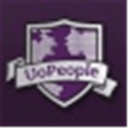University of the People Alternatives

University of the People
University of the People is the world’s first tuition-free, non-profit, online academic institution dedicated to opening access to higher education globally for all qualified individuals, despite financial, geographic or societal constraints.
Founded in 2009 by educational entrepreneur Shai Reshef, UoPeople is affiliated with the United Nations GAID, the Clinton Global Initiative, and Yale Law School ISP. UoPeople has signed collaborative partnership agreements with New York University (NYU) to accept students; and with Hewlett-Packard (HP), through the Catalyst Initiative, to provide student internship opportunities. UoPeople offers undergraduate programs in Business Administration and Computer Science. To date, more than 1500 students from 136 countries have been admitted. Of students polled consecutively each term, 95% would recommend UoPeople to a peer.
With its tuition-free online programs, University of the People is opening access to higher education for all those constrained, as well as building a scalable and replicable model capable of changing the very nature of higher education. The non-profit UoPeople has managed to succeed in cutting down almost the entire cost of higher education, and does not charge for tuition or books/materials. All that is asked is for students to pay a one-time application processing fee ($50) and subsequent modest examination processing fees ($100) levied per course. There are no other fees whatsoever.
UoPeople strives to ensure, in keeping with its mission, that no qualified individual is excluded for financial reasons. To assist students in financial need, UoPeople has dedicated student scholarship funds. Corporate sponsors include Hewlett-Packard’s sponsorship of 100 HP Scholars as part of the UoPeople Women Scholarship Fund; and Intel Foundation’s sponsorship of women students from Haiti. UoPeople has launched a Micro-Scholarship Portal, the first of its kind, to allow donors to contribute to individual students.
Best University of the People Alternatives
Hate University of the People? Use another browser! Which one should you go with? Try out these other browsers before making your final decision. Want some more context? We've got a great list of alternatives to University of the People here.

Khan Academy
FreeWindowsWebAndroidiPhoneWindows SAndroid TabletiPadKhan Academy is not-for-profit with the goal of changing education for the better by providing a free world-class education to anyone anywhere. All of the site's...
Features:
- Multiple languages
- Ad-free
- Community based
- Education
- Gamification
- Interactive exercices
- Mobile friendly
- Resource export
- Support for subtitles
- Unit Testing
- User Levels

Coursera
FreemiumWebAndroidiPhoneAndroid TabletWindows PhoneiPadFree and paid courses on a wide variety of subjects from scholastic to technical and more.
Features:
- MOOC
- Education

Udemy
CommercialWebAndroidiPhoneAndroid TabletiPadUdemy is an online learning and teaching marketplace with over 80000 courses and 24 million students, it uses content from online content creators to sell for profit.

edX
FreeWebBased on a long history of collaboration and their shared educational missions, the founders are creating a new distance-learning experience. Anant Agarwal, former...
Features:
- MOOC
- Education
- Free courses

SoloLearn
FreemiumWebAndroidiPhoneWindows PhoneLearning has never been this social and accessible for so many! Bit-sized videos and fun practice sessions grab your attention and keep you focused, for guaranteed best...
Features:
- Education
- Free courses
- Java
- Live sandbox

Udacity
CommercialWebOur mission is to bring accessible, affordable, engaging, and highly effective higher education to the world.

Wikibooks
FreeOpen SourceWebWikibooks is a Wikimedia community for creating a free library of educational textbooks that anyone can edit.

TED-Ed
FreeWebTED-Ed’s commitment to creating lessons worth sharing is an extension of TED’s mission of spreading great ideas. Within the growing TED-Ed video library, you will find...

Wikiversity
FreeOpen SourceWebWikiversity is a Wikimedia Foundation project devoted to learning resources, learning projects, and research for use in all levels, types, and styles of education from...
Features:
- Education
- Wiki

CourseFinder
FreeWebCourseFinder helps you find the course that’s right for you. Whether you're looking for a job, changing careers or just looking for a course to develop your hobby...
Upvote Comparison
Interest Trends
University of the People Reviews
Add your reviews & share your experience when using University of the People to the world. Your opinion will be useful to others who are looking for the best University of the People alternatives.